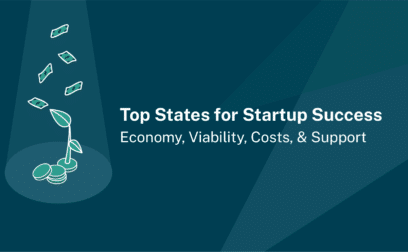TABLE OF CONTENTS
Whether you want to expand your small business in Maine or are just starting out, finding the right business financing can help your business succeed. There are many funding options for small businesses in Maine, and it can be hard to know where to begin.
Learn more about how to finance your Maine small business, including finding a small business loan, what qualifications you may need, how to apply and alternative financing options.
A business loan is one of the most popular ways that small business owners finance their business operations. When a business owner takes out a business loan, they get a lump sum of money that they agree to repay over time (terms) with interest (rates). Some loans, including many SBA loan programs, require a down payment or collateral to secure the loan. Other loans, such as equipment financing and SBA 504/CDC loans, have rules on how the borrower can use the money, including on commercial real estate, property improvements or equipment.
Maine’s business owners have a wide range of business loans to choose from, including:
Each of these business loan programs will come with its own eligibility requirements, terms and benefits. Understanding how much money you need, what you need it for and how much you can afford to repay will help you narrow down which loan you want to apply for.
A business grant is a popular way for Maine businesses to get some financing for their company without having to repay it. Many business grant programs may also give your company a boost by providing extra marketing, mentoring or networking for free. The downside is that, because it’s “free money”, getting a business grant can be very difficult. Applying for grants can be time consuming and you may not get as much money as other financing options. Still, participating in a grant program can be a good way to get your business’s name out to the public, even if you don’t win the money.
To find a business grant in Maine, start by exploring government-sponsored programs, such as those offered by the Maine Department of Economic and Community Development or federal grants through Grants.gov. Local chambers of commerce and industry-specific associations might also have valuable insights and can provide information on grants specific to your sector.
Networking within the business community, including on social media such as LinkedIn, can also uncover hidden opportunities, and attending workshops or seminars may provide insights into available grants. Additionally, online platforms and grant databases can ease the process.
Remember to keep an eye out for updates on available grants and deadlines. When you find a grant that fits your needs, craft a compelling proposal, emphasizing why your business fits with the grant’s objectives.
Securing a loan in Maine involves a series of steps for a successful process. Check out this guide to guide you through it:
Finalize the agreement: Sign the loan agreement and meet any additional requirements set by the lender, including any stipulations on how you spend the money so you can avoid defaulting on the loan.
If you don’t qualify for a business loan or don’t feel comfortable applying for one, there are still many financing options available to small businesses in Maine.
Each of these financing options comes with its own benefits and drawbacks. Always carefully read terms and conditions before you sign any offer for financing.
Lenders will often use your credit score to determine your ability to pay back a loan, so it plays an important part in securing a loan. For traditional loans, a good to excellent credit score (typically 700 or higher) increases your approval chances and may allow you to get lower interest rates. Alternative lenders or funding options, like peer-to-peer lending or online loans, may be more flexible, accepting lower credit scores, sometimes as low as 550. However, they will usually charge higher interest rates to make up for the risk. Some government-backed programs, such as those from the Small Business Administration (SBA), may lend to those with credit scores of 620-640.
While a higher credit score expands your opportunities for securing financing, lower scores don’t necessarily disqualify you. Lenders also consider factors like business performance and financial health. They may also consider your business plan as a factor in determining whether to lend to you or not. Check the specific requirements of your desired lender or program to determine the credit score needed for your particular financing goal and take steps to improve your score if necessary.
The interest rates on business loans in Maine vary based on factors such as the type of loan and your creditworthiness. Traditional bank loans often offer competitive rates, ranging from 5.89% to 10% on average. SBA loans, backed by the government, are tied to the U.S. Prime Rate and range between 8.5 – 15.5%. Alternative lenders, like online platforms, may provide quicker approvals but come with higher rates, ranging from 10% to 30% or more, depending on risk factors.
Your business’s financial health and credit score will influence the interest rate you qualify for. It’s important to compare offers and negotiate terms to secure the most favorable rate for your business loan in Maine.
The time it takes to receive funds for a business loan in Maine varies depending on the loan type and lender. Traditional bank loans may take several weeks to months due to a thorough application and approval process, including underwriting. SBA loans, while offering favorable terms, also require patience and may take weeks to process, with some loan programs taking as much as six months to fund.
In contrast, online lenders often provide quicker approval and funding, sometimes within a week or even a few days. Again, you will probably pay higher interest rates to secure these loans, but if you need the money fast, it may be a good option for you.
You can speed up the loan application process by efficiently preparing and organizing required documentation, responding promptly to any requests for additional information and choosing a funding option that fits your business’s financial needs.
Finding the right funding for your business can be a long process, but it can make all the difference in your business’s success. Start by clearly understanding your financial needs and consider factors like startup costs, operational expenses and potential growth plans. Then, check out the loan programs available in Maine, including traditional bank loans, Small Business Administration (SBA) programs and alternative lenders. Compare each option and consider their terms, interest rates and eligibility requirements.
Check your credit score, as it often influences the terms you qualify for. Gather all necessary documentation to ease the application process. Reach out to potential lenders, explore online platforms and carefully compare offers. It can also be a good idea to seek advice from financial experts or business consultants to gain valuable insights. By combining these steps, you can find and secure the best funding option to start or grow your business in Maine.
Ready to take your business to the next level? Swoop’s got your back all the way. We offer a wide range of funding options and are here to assist you in everything it takes to make your business grow. Get started today.
Daire made it happen! There is no doubt that Swoop sped up the process and found lenders that worked to our time scale rather than the other way round
Hocque Figureoa
Joint owner, F45 Virginia
Swoop was actually very helpful in helping us get our initial fundraising in place. Swoop was able to connect us with investors, with grant financing options and debt financing options.
Viler Lika
Founder, SingleKey
Pedja was amazing. Super supportive, understanding of our needs and wasn't pushy at all. We've been going back and forth with Swoop for over a year inquiring about different financing options and they were patient until we were ready!
Chris Skeates
F45 Multi-studio owner
Join the 95,000+ businesses just like yours getting the Swoop newsletter.
Free. No spam. Opt out whenever you like.
Kingfisher Way, Silverlink Business Park, Newcastle upon Tyne, NE28 9NX, UK
View in Google Maps35 Bull Street, Lewis Building, Birmingham B4 6AF, UK
View in Google MapsAberystwyth Innovation and Enterprise Campus
Gogerddan Campus
Aberystwyth University
Ceredigion
SY23 3EE
Dogpatch Labs, The CHQ Building, Custom House Quay, Dublin, Ireland
View in Google MapsSuite 801, Level 8, 84 Pitt Street, Sydney, NSW 2000, Australia
View in Google Maps43 W 23rd St, New York, NY 10010, United States
View in Google Maps21 Dreyer Street, Cape Town, South Africa, 7708
View in Google MapsClever finance tips and the latest news
Delivered to your inbox monthly
Join the 95,000+ businesses just like yours getting the Swoop newsletter. Free. No spam. Opt out whenever you like.




